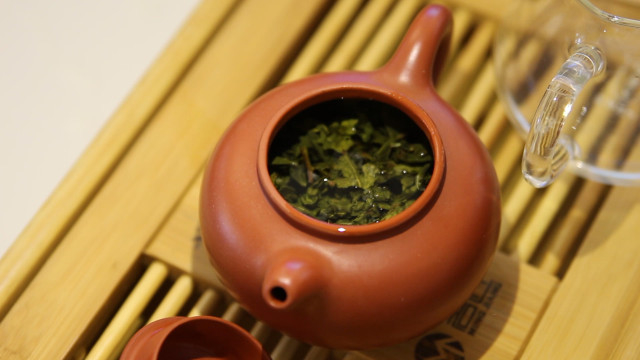Even though coffee is a cultural obsession in the U.S., drinking Chinese tea in the States has risen in popularity as well. In this how-to video, we walk you through the steps to properly prepare and experience a traditional Kung Fu-style tea ceremony.

Demonstration by CCTV America’s Serena Lin.
U.S. embraces Chinese tea traditions and lifestyle
CCTV’s Zou Yun takes us to Washington State to explore how Chinese tea is changing the lifestyle of some Americans.

U.S. embraces Chinese tea traditions and lifestyle
CCTV's Zou Yun takes us to Washington State to explore how Chinese tea is changing the lifestyle of some Americans.In Seattle, a city known as a mecca for coffee, more Americans are becoming Chinese tea drinkers, and Jeffery Mclntosh, a tea industry specialist, is one of them.
About seven years ago, he was feeling the pressure from school and work. Then he had an unexpected encounter with a tea shop in Chinatown in Seattle. He said from that first sip of Chinese tea, a door opened that led him to a different way of living.
“I want to do a project and went to Chinatown. I saw a small tea shop, and a woman welcomed me and said, drink a cup of tea. I drink then and I sat there, I drank some tea, and all of my stresses went away. I was at peace for the first time in a long time. And I realize that this is what I want to be doing for the rest of my life. I want to have a cup of tea in my hand,” Mclntosh said.
This simple idea prompted Jeffrey to make some bold moves: he left college, quit his job, started an apprenticeship at several tea shops, and traveled to Yunan, a famous tea producing province in southwestern China. This is where he learned everything about Chinese tea and fell in love with Puer, a fermented dark tea that may seem alien to most Americans.
“The more I drink it, the more I interact with it, the more I fell in love with Puer tea. Because of the depth of it, and the culture, and the meaning. And I really did believe that if you could just give someone a cup of tea, and make them happy, just like I had that same feeling, when I first drank tea. Then I felt like I would be successful,” Mclntosh said.
Not only are more Americans drinking Chinese tea, many started to share their love for it and encourage people to live a healthy and balanced lifestyle. Roberta Fuhr, owner of Experience Tea Studio, has been drinking tea for three decades. She decided to leave the banking industry and open a tea studio in a Seattle suburb.
In a tea class, Fuhr introduces nearly 10 types of different teas to students and helps them explore the beauty of Chinese tea culture.
“It helps people understand cultures, without knowing the language. Appreciating tea shows respect for a culture, that values tea,” Fuhr said.
The numbers appear to support Roberta’s contention that tea consumption is on the rise. The U.S. market has more than quadrupled since 1990 from about $2 billion in sales to more than $10 billion in 2013, according to the U.S. Tea Association a trend expected to continue.
 CGTN America
CGTN America
